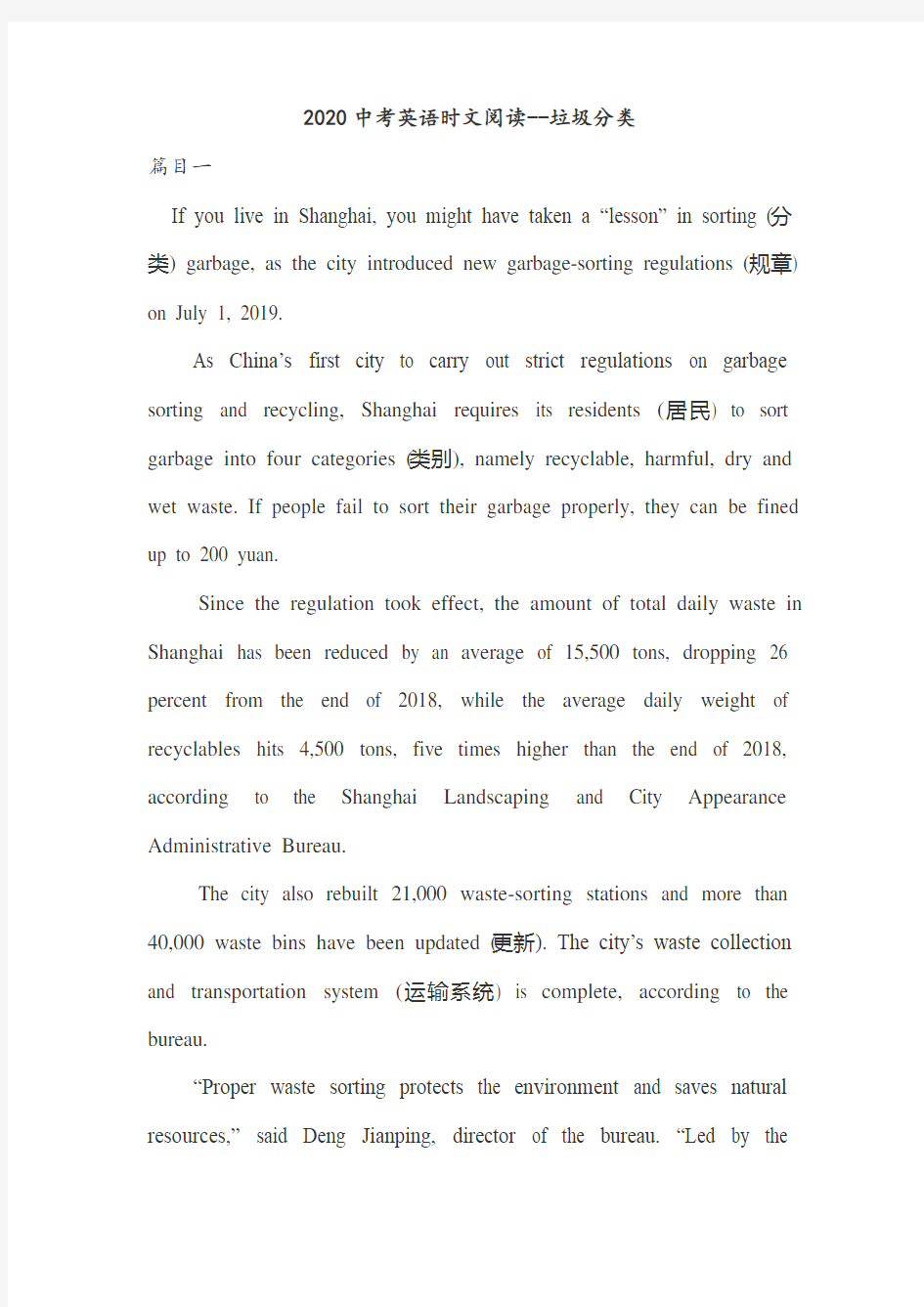2020中考英语时文阅读训练——垃圾分类

- 1、下载文档前请自行甄别文档内容的完整性,平台不提供额外的编辑、内容补充、找答案等附加服务。
- 2、"仅部分预览"的文档,不可在线预览部分如存在完整性等问题,可反馈申请退款(可完整预览的文档不适用该条件!)。
- 3、如文档侵犯您的权益,请联系客服反馈,我们会尽快为您处理(人工客服工作时间:9:00-18:30)。
2020中考英语时文阅读--垃圾分类
篇目一
If you live in Shanghai, you might have taken a “lesson” in sorting (分类) garbage, as the city introduced new garbage-sorting regulations (规章) on July 1, 2019.
As China’s first city to carry out strict regulations on garbage sorting and recycling, Shanghai requires its residents (居民) to sort garbage into four categories (类别), namely recyclable, harmful, dry and wet waste. If people fail to sort their garbage properly, they can be fined up to 200 yuan.
Since the regulation took effect, the amount of total daily waste in Shanghai has been reduced by an average of 15,500 tons, dropping 26 percent from the end of 2018, while the average daily weight of recyclables hits 4,500 tons, five times higher than the end of 2018, according to the Shanghai Landscaping and City Appearance Administrative Bureau.
The city also rebuilt 21,000 waste-sorting stations and more than 40,000 waste bins have been updated (更新). The city’s waste collection and transportation system (运输系统) is complete, according to the bureau.
“Proper waste sorting protects the environment and saves natural resources,” said Deng Jianping, director of the bureau. “Led by the
central government, Shanghai is making efforts to develop long-term solutions to garbage m anagement.”
However, there have also been some problems. Some people complained that it is difficult to deal with wet garbage, as they are asked to remove wet garbage from its bag when dumping (倾倒). According to the sorting rules, the wet garbage must go in the wet waste bin and the bag must go in the dry waste bin.
This separation is necessary, as it ensures that the wet garbage will decompose (分解) properly and become useful organic (有机的) waste, the bureau said.
Plastic bags can affect this process. Some people in Shanghai are instead using paper bags that can biodegrade(生物降解)or plastic containers that can be washed and reused, according to Xinhua.
1. People in Shanghai are asked to sort their garbage into the _____ categories.
A. recyclable, dry, harmful and kitchen waste
B. recyclable, kitchen, dry and “other” waste
C. harmful, recyclable, dry and “other” waste
D. harmful, recyclable, dry and wet waste
2. What does the third paragraph tell us?
A. The garbage-sorting regulation has already brought improvements.
B. Recyclable waste comes out to two-thirds of the total daily waste.
C. In 2019, people produced less waste than in 2018.
D. Shanghai needs stricter rules to deal with waste.
3. According to Deng Jianping, Shanghai _____.
A. has added more than 40,000 waste bins
B. has had problems with garbage management
C. will help other cities make garbage-sorting regulations
D. is still looking for long-term solutions to deal with garbage
4. What does “this process” in the last paragraph refer to?
A. The process of sorting garbage.
B. The process of dumping wet waste.
C. The process of decomposing wet waste.
D. The separation of wet waste and dry waste.
5.This article tell us_______.
A. why Shanghai must sort their garbage.
B. how Shanghai sorts their garbage
C. the reason of the garbage-sorting regulation and some achievement. D.how to protect our environment
篇目二
